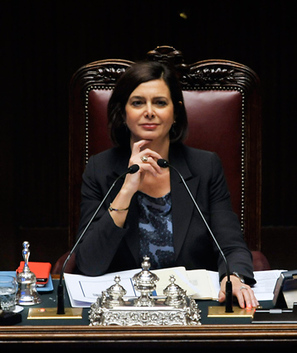The President

Laura Boldrini began her career in 1989 at the United Nations. She worked at the Food and Agriculture Organization (FAO), the World Food Programme (WFP) and served as spokesperson of the UN High Commissioner for Refugees (UNHCR).
She carried out several missions to crisis areas, including the Former Yugoslavia, Afghanistan, Pakistan, Iraq, Mozambique, Angola and Rwanda. For these activities she has received several honours and awards.
In 2013 she became a Member of Parliament and was elected President of the Chamber of Deputies on 16th March of the same year.
Innovative and visionary action has been the hallmark of her term of office, with a focus on social and gender issues, inequalities and peripheries, budgetary savings and transparency, violence on the web and fight against fake news.
For the first time in a Parliament she established a Committee on the Internet and digital media as well as a Committee to combat hate phenomena, named after the British MP Jo Cox, brutally murdered by a neo-Nazi pro-Brexit extremist.
She has been steadfastly committed to relaunching the European project, also by promoting, in 2015, the Declaration "Greater European integration: the way forward", signed by 15 Speakers of Parliament.
She has launched an awareness-raising campaign on fake news, called 'BastaBufale' (Stopfakenews), which was supported by over 20,000 people. She then started a cooperative project with the Ministry of Education, University and Research to promote a national digital education campaign against fake news (#BastaBufale) in schools, involving over 4 million students.
She has published several books: Tutti indietro (Rizzoli 2010), Solo le montagne non si incontrano mai (Rizzoli 2013), Lo sguardo lontano (Einaudi 2015) and La comunità possibile (Marsilio 2017).
In 2017 she was awarded an honorary degree by the American University of Rome in acknowledgement of her institutional, social and civic engagement throughout her career; her tireless endeavours to uphold fundamental rights, human dignity and equal opportunities against all forms of discrimination and violence; her focus on women and their contribution to society; her political ability and honesty; her bold stance against cultural stereotypes.
-
(Florence, 27 november 2015)
-
(Rome, WFP headquarters - November 11th 2014)
-
(Turin, Teatro Regio - April 10th 2013)
-
(March 16th 2013)



